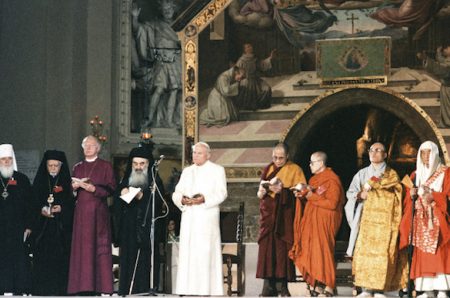Pope Francis is making history today. He is visiting Assisi, the Italian town famously associated with his namesake, St. Francis. The purpose of the visit is to participate in a gathering of leaders from different religions hosted by the Community of Sant’ Egidio.
It was thirty years ago when Pope John Paul II convened the First World Day of Prayer for Peace in Assisi, back in 1986 (pictured above). You have seen the photograph of colorfully clad clerics from a variety of religious backgrounds, including the Dalai Lama, standing together on the dais. Some historians have noted that it was among the few moments of divergence between John Paul II and his reliable lieutenant of doctrine, Cardinal Joseph Ratzinger, who did not attend the event. Sandro Magister explains:
Ratzinger himself recalls this in his book-length interview published in recent days: “He [the Pope] knew,” he says, “that I was following a different approach.”
A dialogue among the religions on an equal footing – Ratzinger has in fact warned even after his resignation of the papacy – would be “lethal for the Christian faith.” Because every religion “would be reduced to an interchangeable symbol” of a God assumed to be equal for all: “Renunciation of the truth is lethal for the faith”
My friend Eduardo Echeverria helpfully explains the theological context of ecumenical and inter-religious meetings such as Assisi, pointing out that Francis and the Catholic Church are not intending to promote a lowest-common-denominator egalitarianism. Ed quotes Vatican II, which says, “The Catholic Church rejects nothing that is true and holy in these religions.” (Nostra aetate §2). At the same time the Church unequivocally affirms “the duty of the Church’s preaching to proclaim the cross of Christ as the sign of God’s all-embracing love and as the fountain from which every grace flows.”
Despite these important qualifications, the pontificate of Pope Francis has some onlookers wondering whether inter-religious gatherings such as Assisi properly uphold the exclusivity of Christ. It was Francis, you will recall, who called proselytism “solemn foolishness” in the context of casting his missional vision. Moreover, it was Francis who makes an inter-religious plea in the following video, where he joins together in solidarity with a Buddhist, a Jew, and a Muslim. In Francis words, “Many seek God and find God in different ways. In this broad spectrum of religions there is only one certainty for us: we are all children of God.”
Among the concerns that emerge from the pope’s video is his use of the phrase “children of God.” That all people, from whatever religion—or no religion at all—are made in God’s image and therefore of supreme value in God’s sight is undisputed. The problem stems from the New Testament usage of the term “children” to describe those who believe in Christ (e.g., John 1:12, cf. Rom 8:16, 17, 9:8; Eph 5:1). In this biblical context, the designation “children” applies to men and women who have undergone spiritual rebirth, by means of Jesus’ atoning death and resurrection.
From an evangelical Protestant point of view, the leading edge of Christian identity and calling consists in explicit testimony to the good news that Jesus Christ is Lord. It is why, for example, evangelicals frequently quote John 14:6, “[Jesus said] “I am the way, and the truth, and the life. No one comes to the Father except through me.” Such is the heartbeat of evangelical faith—the conviction that salvation through Christ alone is to be embodied and proclaimed to the world, for it is why the Lord Jesus said in Acts 1:8, “you will be my witnesses.” In other words, gospel witness strikes at the heart of our identity and grows out of our being. Such witness may not be popular in a pluralistic age; but it is the central purpose and overriding commitment of men and women whose lives are embedded in the only Savior, Jesus Christ.





